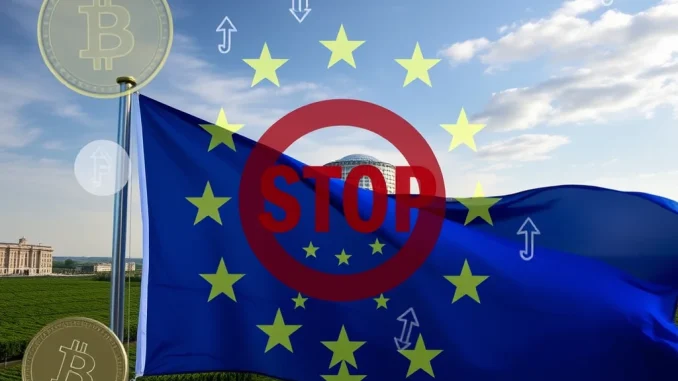
Big news from Europe! If you’re involved in the crypto world, especially if you value transaction privacy, you need to know about the upcoming **EU crypto ban**. The European Union is tightening its grip on digital assets with significant new Anti-Money Laundering (AML) regulations. This move is specifically targeting tools designed for anonymity.
What is the EU Crypto Ban Targeting?
Starting in 2027, the new EU rules will introduce strict prohibitions. At the core of these regulations are two key areas:
- **Privacy Tokens:** Cryptocurrencies specifically designed to obscure transaction details (sender, receiver, amount) will be prohibited.
- **Anonymous Accounts:** Financial institutions and Crypto Asset Service Providers (CASPs) operating within the EU will be banned from offering or maintaining anonymous cryptocurrency accounts.
This development, as reported by Cointelegraph and other outlets, is part of a larger regulatory push aimed at increasing oversight and control over the crypto landscape across all member states. The goal is to prevent the use of crypto for illicit activities.
Why is the EU Implementing This Strict Crypto AML?
The primary driver behind this regulatory action is the fight against financial crime. Global regulators, including those in the EU, have long expressed concerns that cryptocurrencies, particularly those offering enhanced privacy or accounts without rigorous identity verification, can be exploited for money laundering, terrorist financing, and other illegal purposes.
The new **crypto AML** framework is designed to bring the crypto sector in line with traditional finance regulations, where anonymous accounts are already largely prohibited and strict ‘Know Your Customer’ (KYC) and ‘Anti-Money Laundering’ checks are standard practice. By eliminating privacy tokens and anonymous access, authorities aim to create a more transparent system where transactions and users can be identified and traced when necessary.
Which Privacy Tokens Might Be Affected?
While the specific list of prohibited privacy tokens is yet to be definitively finalized and published by the EU authorities, the regulation targets tokens whose core function is to enhance anonymity beyond standard blockchain pseudonymity. Examples often cited in discussions around privacy coins include Monero (XMR), Zcash (ZEC), and Dash (DASH), though the technical implementation and degree of privacy vary among them. The final determination will likely depend on the EU’s technical assessment criteria for ‘privacy-enhancing’ features.
It’s important to note that the ban is on the *handling* of these tokens by regulated entities (like exchanges and custodians) within the EU, as well as the *provision* of anonymous accounts. This means EU-based CASPs will have to delist such tokens and ensure all user accounts are fully verified.
What Does This EU Crypto Law Mean for Users and Businesses?
The implications of this **EU crypto law** are significant for various stakeholders:
- **For Users:** EU residents using privacy tokens or anonymous accounts on EU-based platforms will need to adjust. They may need to move assets to non-EU platforms (which comes with its own risks) or cease using these specific assets and account types. All users interacting with EU-regulated CASPs will undergo stricter identity verification.
- **For Crypto Asset Service Providers (CASPs):** EU-based exchanges, wallets, and other service providers must implement robust systems to identify and verify all users. They will need to delist privacy tokens that fall under the ban and ensure their platforms do not allow for anonymous access. This requires significant technical and compliance investment.
- **For the Market:** The ban could potentially reduce liquidity for affected privacy tokens within the EU market. It also sets a precedent that other jurisdictions might follow, impacting the global market for these specific assets.
When Does This Regulation Take Effect?
The new regulations are set to become effective in 2027. This provides a lead time for financial institutions and CASPs to update their systems, compliance procedures, and service offerings to align with the new requirements. However, preparation and adaptation will need to begin well before the deadline.
How Does This Fit into the Broader EU Regulatory Picture?
This ban on privacy tokens and anonymous accounts is part of the EU’s wider strategy to regulate the digital asset space. It complements the Markets in Crypto-Assets (MiCA) regulation, which focuses on licensing, governance, and consumer protection for CASPs and stablecoin issuers. The AML regulations specifically address the financial integrity and anti-crime aspects of crypto usage.
Together, MiCA and the new AML framework represent a comprehensive approach by the EU to bring clarity, stability, and oversight to the crypto market, aiming to mitigate risks while fostering innovation within a regulated environment.
Navigating the Future: What Should You Do?
If you are an EU-based crypto user or operate a crypto business in the EU, it’s crucial to stay informed about the specifics of this upcoming **EU crypto ban**. Monitor official EU publications and guidance from regulatory bodies as the 2027 deadline approaches. Review your current use of privacy tokens and anonymous services and consider how you will adapt to comply with the new rules. For businesses, engaging with legal and compliance experts familiar with EU crypto regulations is essential to ensure a smooth transition.
A Compelling Summary: The End of Anonymous Crypto in the EU?
The EU’s decision to ban privacy tokens and anonymous crypto accounts by 2027 marks a pivotal moment for the European crypto market. Driven by strong **crypto AML** objectives, this move signals a clear shift towards greater transparency and traceability in digital asset transactions. While proponents argue it’s a necessary step to combat financial crime and legitimize the crypto industry, critics raise concerns about the potential impact on financial privacy and innovation. As the deadline looms, the crypto community in Europe must prepare for a future where anonymity, at least within the regulated ecosystem, will become a relic of the past under the new **EU crypto law**.



